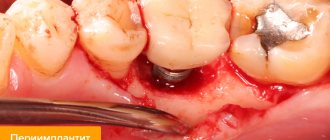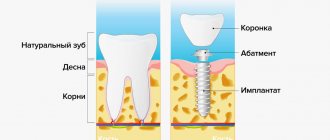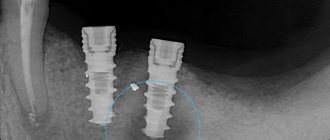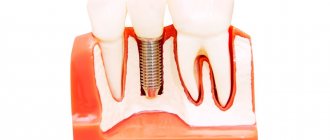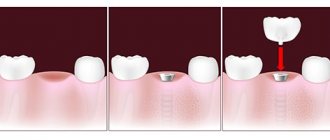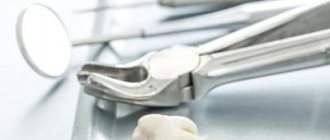Implantation is considered a safe and effective procedure, since in most cases there are no serious complications and the new tooth takes root well. But not everything is rosy. During the adaptive period, many unpleasant things can await you.
After implantation, the gums often become inflamed, visible swelling of the jaw appears, and the temperature rises. In the next three days, the intensity of the processes may increase, but in the normal course of events, already on the sixth to eighth day everything will return to normal.
It is very important to understand whether everything is going according to plan or whether specialist intervention is required. Let's figure out what consequences can be considered acceptable, and for what symptoms it is better to call a doctor immediately.
Causes of swelling after implantation
The causes of swelling on the gum or cheek after dental implantation lie in physiology. Due to tissue injury, there is an influx of lymphatic fluid, which allows the operated area to regenerate (recover). Injuries during implantation are inevitable - after all, the dentist needs to make cuts or small holes in the gums, prepare a bed in the bone for the implants, then install them, and apply sutures if necessary. When removing diseased teeth/roots immediately before implantation, microtraumas also appear.
New teeth in 1 day - All-ON-4 - 180,000 rub.
All inclusive!
3D modeling of the structure with a prosthesis, implantation of 4 Osstem implants, installation of a fixed prosthesis on the same day. Free consultation with an implantologist +7 (495) 215-52-31 or write to us
How to relieve swelling after implant installation
Rinsing with anti-inflammatory herbal decoctions will help relieve swelling.
Non-steroidal medications that have an anti-inflammatory effect will help relieve swelling after implantation. Implantation always injures tissues; the following medications will help eliminate pain and prevent the development of inflammation:
- Metamizole sodium;
- Nimesulide;
- Diclofenac sodium;
- Nise et al.
The drugs should not be taken systematically, but only as needed, unless the doctor recommends a different regimen.
If signs indicating the onset of an inflammatory process are detected, the doctor prescribes antibiotics (Ampiox, Augmentin, Erythromycin).
Rinsing works well for swelling. The following solutions are used:
- Chlorhexidine;
- Furacilin tablet diluted in water;
- a decoction of medicinal plants that have an anti-inflammatory effect (chamomile, calendula, sage, oak bark, etc.).
Important! When rinsing your mouth, you should not make active movements, so as not to further injure the dentin and prevent impact on the implant.
What determines the size of the edema?
The amount of facial swelling after dental implantation can vary significantly - for some, the cheek “inflates” as if water had been taken into the mouth, while for others there may be no swelling at all. In general, the size of the jaw swelling after implantation, and how long it lasts, depends on the following factors:
- skill of a dentist-implantologist: modern doctors practice 3D implantation planning. Before the operation, a special program based on computed tomography of the patient’s jaw selects the optimal models of implants and their placement locations, taking into account the density and volume of the bone, the location of large vessels and nerves. Next, individual templates are printed that will allow the implants to be installed in reality exactly in accordance with the plan and with minimal tissue trauma. That is, the level of injury is significantly reduced,
- quantity, size and quality of implants - the more installed, the higher the likelihood of swelling,
- method of implant installation: minimal swelling, as a rule, occurs after “bloodless” (or minimally invasive) implantation. More extensive - after a patchwork (when incisions are made in the gums and sutures are placed), after simultaneous replantation of a bone block, after a sinus lift in the area of the lateral upper teeth (raising the bottom of the maxillary sinus),
- individual characteristics of the patient’s body: age, presence or absence of chronic pathologies, tolerance to medications (prescribed after dental restoration). In particular, edema often occurs in the presence of problems with the cardiovascular system,
- compliance with postoperative rules (more on this below).
Medicines to relieve swelling
Your doctor may recommend that you take antibiotics and treat your mouth with chlorhexidine solution - all this has a calming effect and also prevents the development of infection.
In addition, painkillers will come to the rescue - many of them relieve inflammation (Nise, Ketanov, Ketorol). You can locally use gels that have an anti-inflammatory effect (Lioton, Trombless, Heparin).
If you know you are prone to developing lumps or swelling after surgery, tell your dentist.
How long does swelling last normally and how quickly can it go away?
How many days does swelling last after dental implantation? Here it is worth starting with the fact that immediately after installation of implants there is no swelling or it is mild. But after 12-24 hours, swelling can noticeably increase in size - this is clearly visible in the photo. Maximum swelling is observed 2-3 days after implantation. And this is absolutely normal. How long the swelling lasts depends on the physiology of the individual patient. Usually, 3-4 days after the installation of implants, swelling begins to subside (on average, noticeable swelling lasts 24-36 hours), and after 7 days it is practically not noticeable from the outside.
Minimizing complications
Gum inflammation after implantation depends on many factors. One of the most important is the poor quality of implants. Therefore, you should be careful about their choice. After your doctor gives you options, make sure the implant meets the following requirements:
- the titanium from which it is made has a high degree of purity;
- the design has both micro-thread and macro-thread;
- the implant and abutment are fixed with a conical connection (this is not necessary, but such a connection is considered the most reliable today);
- your future tooth comes with a long, or better yet, lifetime warranty - this is not only a pleasant addition, but also a sign that the manufacturer is confident in its product;
- choose products from companies that have been on the market for a long time and are known to specialists; consult an independent dentist about this.
Do not skimp on the system, as in the future, a bad implant can lead to serious complications, which will be much more expensive to eliminate. Of course, even with high-quality products, the body will try to fight, but nothing serious will most likely await you.
Ways to reduce swelling
What to do to reduce or relieve swelling after implantation? The first “home” remedy is cold compresses. But ice should be used correctly to avoid frostbite or tissue necrosis. What can be done? When you return home after having your implants installed, remove ice, a bag of frozen vegetables/berries, or meat from the freezer. Wrap the ice in a bag and wrap it in several layers of thin cloth (gauze) or wrap it in a terry towel. Apply the cold to your cheek for 5-10 minutes (do not put pressure on your cheek or jaw!), then take a break for 7-10 minutes. Compresses can be repeated for 1.5-2 hours. On the first day after implantation, you can do 2-3 such “cooling” approaches.
What you should never do is apply hot compresses. Because increased temperature increases blood flow to the surgical site, which can lead to increased swelling and increases the risk of inflammation. As a result, recovery will be slower, swelling will persist longer, but the most dangerous thing here is the risk of peri-implantitis and implant rejection.
Recommendations for a speedy recovery after surgery
You should eat at least 2 hours after the procedure, first compiling a menu of soft, gentle food.
Soreness and swelling are considered a normal reaction of the body to manipulation of bone tissue and dentin. However, the characteristic symptoms cannot be called pleasant, so the doctor gives patients some recommendations to alleviate the postoperative condition.
- The first meal after implantation should be no earlier than 2 hours after the pin is inserted.
- If sutures were placed during the operation , the chewing function should be transferred to the teeth of the other side of the jaw.
- It is recommended to periodically apply ice to the cheek on the side of the dental implant. The duration of the procedure should not exceed 15-20 minutes. This helps reduce swelling and suppress pain.
- , the wound around the implant must be treated with a special paste (dental, for example, Solcoseryl), which contains anti-inflammatory and antiseptic agents. The procedure will help speed up the healing process of soft tissues and prevent the development of inflammation.
- After surgery, you should sleep on a high pillow (from a week to a month). This body position helps stop the development of swelling.
- To clean your teeth and oral mucosa, you should choose a brush with soft bristles and a special paste.
- The menu consists of pureed and cooked dishes, this prevents stress on the implant. Only warm food and drinks should be consumed.
- from smoking and drinking alcohol . A cigarette smoked can cause wound infection or inflammation, which will lead to implant rejection.
Tips to reduce discomfort
General recommendations for speedy rehabilitation are as follows:
- tune in to recovery (recovery): watch your favorite movies, listen to music, read optimistic books,
- provide yourself with comfortable conditions at home in advance: buy medicine (more on this in the next section), cook light broth, stock up on pureed food - cottage cheese, yoghurt, you can buy baby food in jars. There should also be a large bottle of clean warm water at home,
- do not overload the body, let all efforts be directed towards regeneration: you can take 3-4 days off from work, do not lift weights, do not play sports, do not take hot baths. Visiting baths, saunas, swimming pools and air travel should also be avoided at first,
- Perform oral baths as prescribed by your dentist: do not rinse, as infection may get into the wound,
- Brush your remaining teeth very carefully, but with a new brush (there are definitely germs on the old one),
- try to chew food on the non-operated side of the row,
- do not suck out the puree and liquid from the tube, it is better to use a spoon: low pressure in the oral cavity can lead to movement of sutures, membranes,
- give up coffee, cigarettes and alcohol (at least at first): there are many reasons for this - drying out the mucous membranes in the oral cavity, overheating of tissues, increased blood pressure, toxic effects. As a result, rehabilitation and engraftment of implants are slower,
- Take all prescribed medications according to the regimen received from your doctor.
Avoid activities that cause blood flow to the head
Surgery is a natural stress for the body. After it, calm and at least a short recovery period are required. Modern high-quality anesthetics make it possible not to feel pain and discomfort not only during the process of dental implantation, but also after it. But you should still give up the idea of rushing to work or solving important matters immediately after dental implantation. Take 2-3 days off. Remember that outside the home it is difficult to provide yourself with proper care and the proper level of comfort.
Swelling after dental implantation becomes stronger and “more terrible” with any actions that provoke overheating of the body, pressure changes, compression of blood vessels and a rush of blood to the head. Let's list them:
- smoking,
- sports,
- plane travel,
- visiting a bathhouse, sauna, steam room,
- exposure to open sun,
- excessive physical activity, hard work,
- consumption of hot and spicy foods, alcoholic drinks,
- warming up the operated area,
- sleep on the side of the body where the implantation was performed: if all the teeth in the mouth were restored at once, then it is recommended to sleep on the back,
- mechanical effect on tissues that were injured during surgery: on the first day you should not use a toothbrush or actively rinse your mouth. It is forbidden to touch the wound with your tongue, fingers, or foreign objects.
Immediately after the procedure, you should avoid flying.
Ensure the flow of blood from the head: for this it is recommended to rest and sleep on a high pillow. For a while, it is worth giving up all foods and drinks that contain caffeine - it is this substance that increases blood pressure, causing even more blood to rush to the head. You cannot drink coffee, cocoa and strong tea, and also eat pepper, ginger, and cinnamon.
What medications are there for swelling?
How to relieve swelling after dental implantation? To relieve swelling, dentists prescribe antihistamines, for example, the drugs Suprastin, Zodak, Loratadine. Depending on the strength of the active substance and the patient’s health condition, decongestants can be prescribed 1-3 times a day, during meals. The course is approximately 5 days.
Read on: useful recommendations for eating and lifestyle immediately after dental implantation.
In addition to eliminating swelling, antihistamines reduce the side effects of antibiotics (which are often prescribed for dental implants). But it is better to give preference to the latest generation drugs, because Early generation antihistamines often cause drowsiness. But, in principle, this drawback can benefit patients with insomnia - after all, the body recovers faster during sleep.
“After installing the implants, I was prescribed three medications at once - antibiotics, for swelling and for pain. They said that the swelling could also be due to slight inflammation, because many implants were implanted at once. And all these medications will help you return to normal life faster. But, to be honest, I didn’t notice much swelling in myself, maybe my cheek puffed up just a little.”
Irina Vladimirovna, 51 years old, review from otzovik.com
Useful tips for preventing inflammation and bleeding gums
On the upper jaw, new teeth take about five to six months to take root; on the lower jaw, it takes about two to four months. The healing time of the bone and gums depends on the quality of the implant, the health of the patient and the condition of the jaw.
To ensure the process is painless and you don’t have any problems in the future, follow these recommendations:
- Visit your dentist periodically (at least twice a year).
- Try to quit smoking or reduce the number of cigarettes to a minimum.
- Carefully care for the implant, remember that it is less strong than your natural teeth.
- At the first signs of gum inflammation, consult a specialist.
Have a beautiful and healthy smile!
When to see a dentist for help
It has already been said above how facial swelling develops normally, and how many days after dental implantation it should go away. Now let's focus on pathological conditions - after all, you need to be able to distinguish the norm from complications[1], which require medical attention:
- the swelling is very large, the skin of the cheek is red,
- the swelling has not decreased in size 4-5 days after surgery,
- the swelling subsided, and a few days later it appeared again,
- bleeding from the wound does not stop or intensifies,
- pus appeared from wounds, from under dentures or putrid odor from the mouth,
- the temperature does not decrease for more than 3 days or suddenly “jumped” after normalization of the condition,
- noticeable numbness of the cheek or tongue does not go away 2-3 days after surgery,
- The stitches on the gum have come apart.
Beam prosthesis RUB 180,000.
Preparation of the oral cavity, individual bar with installation, taking impressions, manufacturing, installation and fitting of dentures. The price is for 1 jaw. Work guarantee up to 2 years! Consultation with a doctor is free! Call now: +7 (495) 215-52-31
Clinical researches
Repeated clinical studies have proven the high effectiveness of Asept products. It has been clinically proven that the two-component mouth rinse ASEPTA ACTIVE more effectively combats the causes of inflammation and bleeding compared to single-component rinses - it reduces inflammation by 41% and reduces bleeding gums by 43%.
Sources:
- Clinical and laboratory assessment of the influence of domestic therapeutic and prophylactic toothpaste based on plant extracts on the condition of the oral cavity in patients with simple marginal gingivitis. Doctor of Medical Sciences, Professor Elovikova T.M.1, Candidate of Chemical Sciences, Associate Professor Ermishina E.Yu. 2, Doctor of Technical Sciences Associate Professor Belokonova N.A. 2 Department of Therapeutic Dentistry USMU1, Department of General Chemistry USMU2
- The effectiveness of the use of Asept “adhesive balm” and Asept “gel with propolis” in the treatment of chronic generalized periodontitis and gingivitis in the acute stage (Municipal Dental Clinic No. 4, Bryansk, Kaminskaya T. M. Head of the therapeutic department Kaminskaya Tatyana Mikhailovna MUZ City Dental Clinic No. 4, Bryansk
- Study of the clinical effectiveness of treatment and prophylactic agents of the Asepta line in the treatment of inflammatory periodontal diseases (A.I. Grudyanov, I.Yu. Aleksandrovskaya, V.Yu. Korzunina) A.I. GRUDYANOV, Doctor of Medical Sciences, Prof., Head of Department I.Yu. ALEXANDROVSKAYA, Ph.D. V.Yu. KORZUNINA, asp. Department of Periodontology, Central Research Institute of Dentistry and Maxillofacial Surgery, Rosmedtekhnologii, Moscow
- The role of anti-inflammatory rinse in the treatment of periodontal diseases (L.Yu. Orekhova, A.A. Leontyev, S.B. Ulitovsky) L.Yu. OREKHOVA, Doctor of Medical Sciences, Prof., Head of Department; A.A. LEONTIEV, dentist; S.B. ULITOVSKY, Doctor of Medical Sciences, Prof. Department of Therapeutic Dentistry of St. Petersburg State Medical University named after. acad. I. P. Pavlova
Associated symptoms after implantation
Along with swelling after implantation, bleeding from wounds, numbness of the cheek, redness of the gums, hematoma on the cheek, pain in the jaw or head, increased body temperature up to 39 degrees, difficulty opening the mouth, weakness, and ringing in the head may be observed. These are also normal conditions, but they should also fade away every day, and not intensify.
[1] Garayev Z.I. Reducing the risk of complications of dental implantation, 2014.
Author: Vasin Yu. A. (Thank you for your help in writing the article and the information provided)
Swelling after tooth extraction: when is there no reason to worry?
Tooth extraction (even a low-traumatic one) is an intervention that does not go away without leaving a trace. When the patient has a healthy and strong body, and the doctor has done his job perfectly, the negative effects are practically not felt and disappear as soon as possible, however, in some cases, pain, swelling and other unpleasant consequences still occur. Acceptable manifestations during the rehabilitation process include:
- elevated temperature (not higher than 37.5 degrees), which normalizes within two days;
- small localized swelling that does not extend to the entire side of the face; If we talk about how long it takes for the swelling to subside after tooth extraction, then on average it goes away within two to three days;
- subtle swelling of the cheek, which disappears already on the second or third day after tooth extraction;
- pain - pain always appears after the anesthesia wears off, but it should not be very strong and bother you for more than four days. Of course, the patient may experience some unpleasant and uncomfortable sensations for ten to twelve days, but the positive trend is a decrease in pain and swelling every day.
What to do if your cheek is swollen after tooth extraction?
Often after a tooth extraction procedure, many people experience swelling that may persist for some time.
Its appearance is natural, since tooth extraction is essentially a surgical operation, after which the wound remaining in the oral cavity remains open. It recovers fairly quickly, but damaged gum tissue will remain swollen for some time. The size of the tumor may depend on several factors, such as the complexity of the removal procedure, the individual characteristics of the person, and the professionalism of the dentist.
Are swollen gums and other advanced symptoms signs of peri-implantitis?
Peri-implantitis is characterized by inflammation of the tissue around the implant and loss of supporting bone. Leads to rejection of the structure and can develop due to:
- medical error;
- low quality implants;
- insufficient oral hygiene.
In the early postoperative period, complications are caused by technical errors during the operation. In the long term - by ignoring hygiene standards.
Medical errors that provoke the development of peri-implantitis:
- violation of asepsis, antiseptics;
- incorrect assessment of risk factors;
- incorrect selection and installation of an implant;
- incorrect crowns, dentures causing periodontal trauma.
Patients at risk for peri-implantitis include:
- with bad habits (smoking);
- periodontal diseases;
- immune diseases;
- bruxism;
- diabetes mellitus
According to the clinic, peri-implantitis can be:
- sharp;
- sluggish;
- in remission;
- in a state of abscess.
It is important to distinguish between peri-implantitis and mucositis - inflammation of the mucosal area adjacent to the implant, not accompanied by a decrease in bone tissue.
How to make a diagnosis
To establish a diagnosis, the doctor examines the patient. During the inspection it is noted:
Undergoing computed tomography as a diagnostic tool for peri-implantitis
- swelling of soft tissues;
- bleeding gums on probing;
- discharge of pus from the peri-implant pocket;
- mobility of the structure;
- the presence of soft plaque on the implant and teeth that are nearby.
Clinical methods for diagnosing peri-implantitis are:
- dental radiography;
- stomatoscopy;
- orthopantomography;
- three-dimensional computed tomography;
- determination of standard dental indices.
How is peri-implantitis treated?
Treatment of the complication is carried out in two stages. First is carried out:
- professional oral hygiene;
- treatment with ozonated solution;
- laser therapy.
The surgical stage of treatment involves:
- revision of the bone pocket;
- removal of necrotic tissue;
- cleaning the surface of the implant with antiseptic agents;
- washing the bone pocket;
- introduction of osteoconductive material into it.
Afterwards, antibiotic therapy and rinsing with antiseptics are prescribed. In case of relapse, removal of the structure and subsequent reimplantation is required.
Average cost in Moscow
Removing a tumor after implantation at home does not require large expenses. The approximate cost of the drugs is given below.
| Name of service | Cost, rub. |
| Synthetic antiseptics | |
| Chlorhexidine | 16 |
| Furacilin | 75 |
| Miramistin | 340 |
| Eludril | 410 |
| Herbal antiseptics | |
| Yarrow | 40 |
| Elecampane | 50 |
| Air | 55 |
| Chamomile | 60 |
| Stomatophyte | 180 |
| Ointments and gels | |
| Asepta | 240 |
| Kamistad | 260 |
| Holisal | 315 |
| Solcoseryl | 370 |
Treatment of complications in dentistry
| Name of service | Cost, rub. |
| Consultations | |
| Dentist | 600 |
| Periodontologist | 740 |
| Implantologist | 820 |
| Healing procedures | |
| Removing dental plaque in the area of one tooth | 180 |
| Periodontal applications in the area of one tooth | 370 |
| Application of a protective periodontal bandage | 400 |
| Laser therapy of the gum mucosa | 490 |
| Implant removal | 6900 |
| Implantation of osteoconductive material in the area of one tooth | 10900 |
| Implantation of a protective membrane | 12900 |




